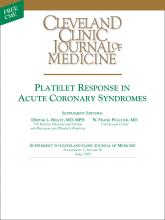ABSTRACT
Managing antiplatelet therapy for patients with acute coronary syndromes (ACS) is complex, and current therapy options and approaches for these patients are suboptimal. Despite the use of available antiplatelet therapies—aspirin, clopidogrel, and the parenteral glycoprotein IIb/IIIa inhibitors—recurrence of ischemic events in patients with ACS continues to rise over time. Moreover, bleeding remains an important—and often underappreciated—risk with these therapies, and national registries demonstrate that dosing of antiplatelet therapies frequently strays from evidence-based guidelines. Recent quality-improvement initiatives developed in conjunction with national registries of patients with ACS promise to improve adherence to guidelines through hospital-specific performance reports. More evidence-based use of existing and emerging anti-platelet agents has the potential to improve both ischemic and bleeding outcomes in patients with ACS.
- Copyright © 2009 The Cleveland Clinic Foundation. All Rights Reserved.






